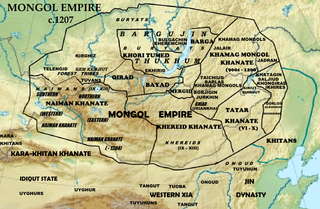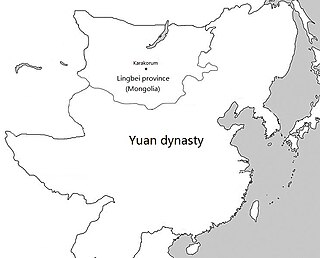Khong Tayiji, also spelled Qong Tayiji, was a title of the Mongols, derived from the Chinese term Huangtaizi.

Demchugdongrub, also known as Prince De, courtesy name Xixian, was a Qing dynasty Chinese Mongol prince descended from the Borjigin imperial clan who lived during the 20th century and became the leader of an independence movement in Inner Mongolia. He was most notable for being the chairman of the pro-Japanese Mongol Military Government (1938–39) and later of the puppet state of Mengjiang (1939–45), during the Second Sino-Japanese War. In the modern day, some see Demchugdongrub as a Mongol nationalist promoting Pan-Mongolism, while others view him as a traitor and a pawn of the Japanese during World War II.

Soong Tse-vung, more commonly romanized as Soong Tse-ven or Soong Tzu-wen, was a Chinese businessman, banker, and politician who served as Premier of the Republic of China between 1945 and 1947.

A yurt or ger (Mongolian) is a portable, round tent covered and insulated with skins or felt and traditionally used as a dwelling by several distinct nomadic groups in the steppes and mountains of Inner Asia. The structure consists of a flexible angled assembly or latticework of wood or bamboo for walls, a door frame, ribs, and a wheel possibly steam-bent as a roof. The roof structure is sometimes self-supporting, but large yurts may have interior posts supporting the crown. The top of the wall of self-supporting yurts is prevented from spreading by means of a tension band which opposes the force of the roof ribs. Yurts take between 30 minutes and 3 hours to set up or take down, and are generally used by between five and 15 people. Nomadic farming with yurts as housing has been the primary life style in Central Asia, particularly Mongolia, for thousands of years.

Nicholas Tse Ting-fung is a Hong Kong actor, singer, songwriter, entrepreneur and TV chef. Tse debuted as a singer in 1996 before shifting his career focus to acting. In 2011, he won the Hong Kong Film Award for Best Actor for his performance in The Stool Pigeon, making him the first person to have won in the three major acting categories, Best Actor, Best Supporting Actor, and Best New Performer, at the Hong Kong Film Awards.

The Storm Riders is a 1998 Hong Kong wuxia fantasy film based on the manhua series Fung Wan by artist Ma Wing-shing. Directed by Andrew Lau, it starred Ekin Cheng as Wind and Aaron Kwok as Cloud. The plot involves two children, Whispering Wind and Striding Cloud, who become powerful warriors under the evil Lord Conqueror's tutelage. A sequel to the film, titled The Storm Warriors was directed by the Pang brothers and released in 2009.

The Ongud were a Turkic tribe that later became Mongolized active in what is now Inner Mongolia in northern China around the time of Genghis Khan (1162–1227). Many Ongud were members of the Church of the East. They lived in an area lining the Great Wall in the northern part of the Ordos Plateau and territories to the northeast of it. They appear to have had two capitals, a northern one at the ruin known as Olon Süme and another a bit to the south at a place called Koshang or Dongsheng. They acted as wardens of the marches for the Jin dynasty (1115–1234) to the north of Shanxi.
The cinema of Mongolia has been strongly influenced by the cinema of Russia, which differentiates it from cinematic developments in the rest of Asia.

College Coach is a 1933 American pre-Code drama film starring Dick Powell and Ann Dvorak. The film features John Wayne in his last bit-part role.

Double Fattiness is a 1988 Hong Kong comedy film directed by David Chiang and starring Bill Tung, Lydia Shum, Eric Tsang and Maggie Cheung.
Ciung Wanara is a legend among Sundanese people, in Indonesia. Ciung Wanara was a nickname of Prince Manarah of Sunda–Galuh Kingdom. He was a relative of the famous King Sanjaya of Mataram.
Gyurme Thekchok Tenzin was the 2nd Dzogchen Rinpoche of Tibet.
The Vagindra script is an alphabetic script for the Buryat language developed by Agvan Dorzhiev in the first decade of the 20th century. It was used only briefly.
List of films released in Assamese cinema in the Assamese language.

Tripura State, also known as Hill Tipperah, was a princely state in India during the period of the British Raj and for some two years after the departure of the British. Its rulers belonged to the Manikya dynasty and until August 1947 the state was in a subsidiary alliance, from which it was released by the Indian Independence Act 1947. The state acceded to the newly independent Indian Union on 13 August 1947, and subsequently merged into the Indian Union in October 1949.

The Yuan dynasty ruled over the Mongolian Plateau, including both Inner and Outer Mongolia as well as part of southern Siberia, between 1271 and 1368. The Mongolian Plateau is where the ruling Mongol Borjigin clan of the Yuan dynasty came from, thus it enjoyed a somewhat special status during the Yuan dynasty, although the capital of the dynasty had been moved from Karakorum to Khanbaliq since the beginning of Kublai Khan's reign, and Mongolia had been converted into a regular province, known as the Lingbei Province, by the early 14th century.

Siri Parakum is a 2013 Sri Lankan Sinhala epic biographical film directed by Somaratne Dissanayake and produced by Renuka Balasooriya. It stars two newcomers Akila Dhanuddhara and Senali Fonseka in lead roles along with Bimal Jayakody and Chandani Seneviratne. Music composed by veteran music director Rohana Weerasinghe. Siri Parakum is the highest grossing Sri Lankan film of all time which earned 36 SL Crores and successfully passed 150 days at theaters.

Beg is a genus of neoceratopsian dinosaur from the early Cretaceous period of Mongolia. The genus contains a single species, Beg tse, known from a partial skull and very fragmentary postcrania. Beg represents the most basal neoceratopsian currently known.

Kokborok Cinema refers to the Kokborok language film industry in Tripura, India and among the Tripuri people. Tripura's Kokborok film industry began in 1986 with Longtharai (1986) directed by Dipak Bhattacharya adapted from Bimal Sinha's novel Karachi theke Longtharai depicting the struggle-ridden life of jhum cultivators in the rural hills of Longtharai followed by the Kokborok film Langmani Haduk (1993) directed by Ruhi Debbarma can be read as a critique of the modern regime. The Kokborok film Mathia (2004) directed by Joseph Pulinthanath, is the first International Award-winning Kokborok film.













